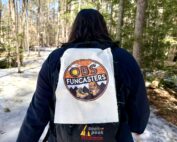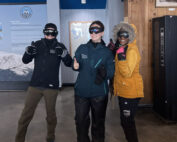Coastal snows
2006-12-08 08:12:17.000 – Neil Lareau, Observer
NULL
Walking to the precipitation can this morning my nostrils froze; -11.1 degrees and it felt good.
A coastal low is trying to redevelop in the Gulf of Maine this morning. That is always a good thing if you like snow. Jeff Derosa (former observer), fresh back from living on a mile or two of ice for a year at latitude 90 degrees south, is likely seeing some heavy snow bands down in Bath, ME this morning. Today could be a good day to cross country ski on the beach. It doesn’t snow like this at the South Pole. Enjoy Jeff.
Here on Mount Washington the winds just turned from NW to NNE. This small change has big implications. First it means that the coastal low is deepening and expanding its reach. Second it displaces some of the coldest air that had arrived from the NW. The temperature just jumped back to -5 from -12. Third, the 5+ inches of snow that fell overnight under light winds from the NW is now entirely airborne creating white out conditions. This change happened in a matter of minutes. Visibility had been relatively good for being in the clouds at ½ a mile. Now it is about 100 feet.
The cold air will be back once the upper level aspects of the system shunt the surface low further to the east today. Windchill values will be dangerous, likely exceeding -40 degrees.
Neil Lareau, Observer
Team Flags Return for Seek the Peak’s 25th Anniversary
Team Flags Return for Seek the Peak's 25th Anniversary By MWOBS Staff Mount Washington Observatory is looking forward to continuing a much-loved tradition for Seek the Peak’s 25th Anniversary: Team flags. In inviting teams
Meet Summer Interns Zakiya, Max and Maddie
Meet Summer Interns Zakiya, Max and Maddie By MWOBS Staff We are excited to welcome six teammates to the summit of Mount Washington this summer! During their internship, these students and graduates will play
Saying Goodbye to the Summit
Saying Goodbye to the Summit By Alexis George After an extraordinary last three years working as a Weather Observer and Meteorologist, I am excited to pursue a different career. As sad I as am




